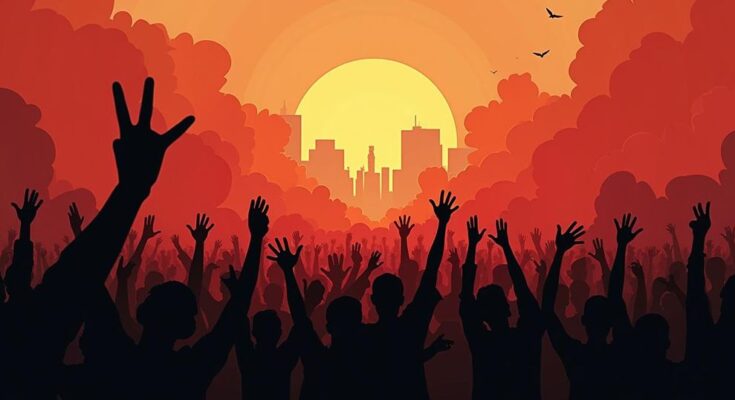Tens of thousands protested in Iranian cities and Yemen on September 27, 2024, condemning Israeli attacks in Lebanon and Gaza following calls from Iranian authorities to support Hezbollah. Demonstrations featured chants against Israel and expressions of solidarity with the Palestinian cause, while similar protests in Bahrain highlighted regional dissatisfaction with normalization efforts with Israel. The backdrop of escalating violence following the war that erupted after Hamas’ attack on Israel adds complexity to the situation.
On September 27, 2024, mass protests erupted in various Iranian cities and the Houthi-controlled capital of Yemen, Sanaa, against Israeli military actions in Lebanon and Gaza. These demonstrations, spurred by a governmental call to support the Iran-backed Hezbollah, highlighted widespread condemnation of what is described as the “bloodbath in Lebanon.” During the protests in Tehran, which followed Friday prayers, large crowds gathered around Enghelab Square holding images of Hezbollah leader Hassan Nasrallah and Palestinian flags, while expressing their disdain through chants such as “Israel is destroyed. Lebanon is victorious.” Additionally, protesters incinerated Israeli and U.S. flags, indicating their solidarity with the Palestinian cause. State media reported similar protests across several cities, including Semnan, Qom, and Shiraz. In Yemen’s capital Sanaa, tens of thousands took to the streets. Demonstrators, armed and vocally supportive of Lebanon, expressed their commitment to the Palestinian struggle. One Houthi supporter stated, “We say to our brothers in Lebanon that you will be victorious, God willing,” suggesting an unwavering solidarity with Hezbollah and the Palestinian people. In Bahrain, which maintains an alliance with Israel but has restricted public demonstrations, citizens held protests voicing their support for Gaza and Lebanon, with calls for a cessation of normalization with Israel. Participants shouted, “The people demand an end to normalization,” reflecting tension in the region provoked by ongoing conflicts. These protests come in the wake of escalating violence since Hamas’ assault on Israel on October 7, which has resulted in continued retaliatory strikes from both Hezbollah and Israeli forces. Analysts contend that Iran is attempting to carefully manage its support for Hezbollah to avoid a wider conflict that could be detrimental to its interests.
The recent protests in Iran and Yemen occur amid a backdrop of intensifying conflict in the region, specifically following the escalation of hostilities between Israel and Hamas. The Iranian government possesses deep ties to Hezbollah, a key player in the so-called “axis of resistance” against Israel, which includes various armed groups aligned with Iran throughout the Middle East. The dynamics of this conflict have fueled solidarity protests throughout the region, as public sentiment strongly opposes Israeli military aggression. The situation is further complicated by Iran’s strategic interests, as it seeks to balance its support for Hezbollah without becoming embroiled in a full-scale war that could escalate irreparably.
The protests on September 27, 2024, signify a collective response in the Middle East against perceived injustices inflicted by Israel in Lebanon and Gaza. With large-scale demonstrations erupting in Iran, Yemen, and even Bahrain, the issue of solidarity with Palestinian people is at the forefront. The protests underscore the complexity of regional alliances and tensions while highlighting the potential for further escalation should the cycle of violence continue. As Iran navigates its support for Hezbollah, the stakes remain high, both for the regional power dynamics and for the civilians caught in the conflict.
Original Source: www.thehindu.com




